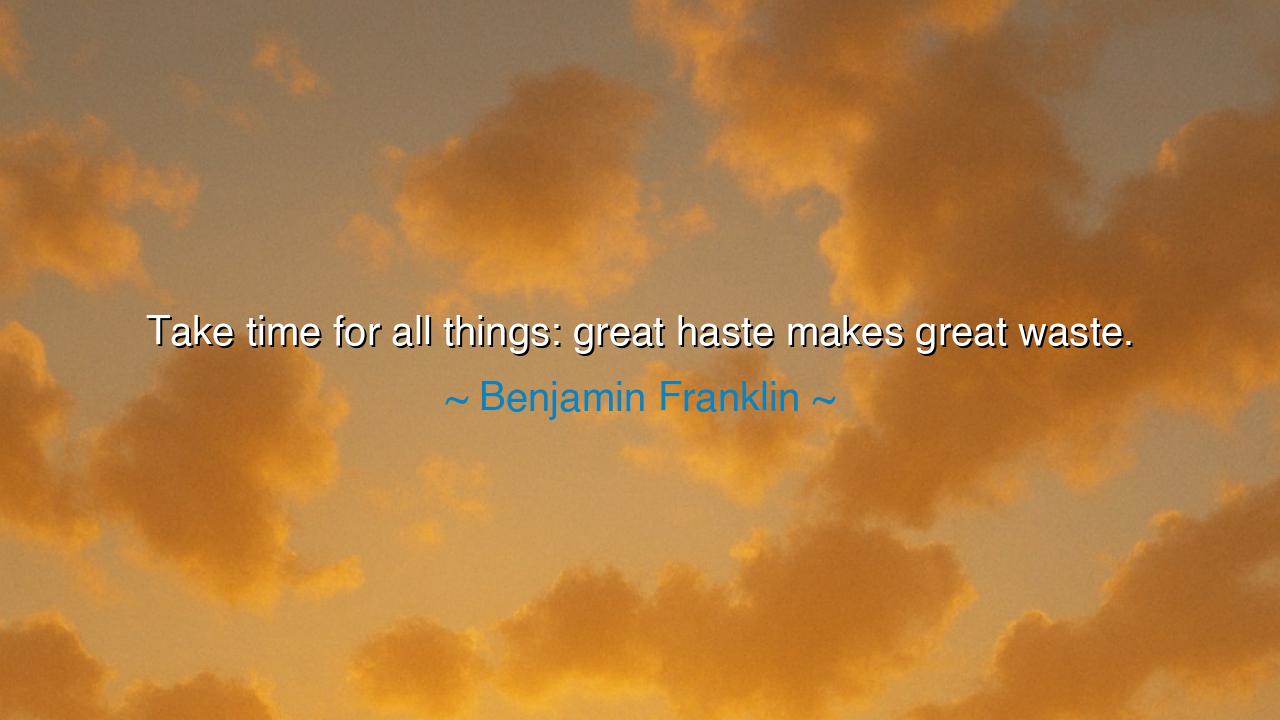
Take time for all things: great haste makes great waste.






“Take time for all things: great haste makes great waste.” Thus spoke Benjamin Franklin, that sage of the New World, whose words have long guided both the industrious and the wise. Though brief, this saying carries the weight of centuries, for it reminds us that time — that invisible thread by which life is woven — must be handled with patience and reverence. In this single admonition, Franklin teaches a truth as old as civilization itself: that speed without wisdom leads to ruin, while steady, deliberate effort builds lasting greatness.
To understand this saying, one must first know the spirit of the man who spoke it. Benjamin Franklin, a printer, inventor, and statesman, lived not for ease but for excellence. His life was a hymn to discipline — he rose before dawn, ordered his hours with care, and labored diligently toward mastery in all things. Yet, though a man of action, he never mistook movement for progress. In his famous Poor Richard’s Almanack, he often warned that haste — the feverish pursuit of accomplishment — breeds folly and waste. The impatient man, Franklin believed, spends his days chasing shadows, while the wise man moves slowly but surely toward the light.
In these words — “Take time for all things” — Franklin urges us to act with mindfulness. Time, he says, is not to be hoarded, but neither should it be squandered. One must give each task its due measure, as a gardener tends each plant in its proper season. To rush the sowing is to spoil the harvest; to force the fruit before its time is to lose its sweetness. So too in life — whether in work, love, or learning — things of value require rhythm, patience, and attention. The craftsman who takes his time creates beauty; the leader who listens before acting creates harmony; the thinker who contemplates before speaking creates truth.
The second part of Franklin’s saying, “great haste makes great waste,” bears a warning as sharp as a blade. When we hurry, we err. When we rush, we destroy the very things we seek to build. Consider the architect who cuts corners to finish his monument quickly; soon, it crumbles. Consider the general who charges into battle without preparation; his soldiers fall needlessly. Even in the smallest affairs of life, impatience is the seed of regret. A meal burnt for want of patience, a friendship lost through careless words, a decision made too soon — all are the children of haste. Franklin’s wisdom reminds us that speed is no virtue if it sacrifices soundness.
This truth has echoed through history. The great Roman general Fabius Maximus, called Cunctator, or “the Delayer,” was mocked for his slow, cautious tactics during the war against Hannibal. Yet his patience saved Rome when rashness would have doomed it. Where others sought glory in quick victories, Fabius sought endurance — and through restraint, he triumphed. His story, like Franklin’s proverb, teaches that those who act with foresight and discipline often achieve what the impetuous cannot. Greatness is not the child of frenzy, but of calm perseverance.
Franklin’s wisdom also reaches into our own age, where the world runs ever faster, and the virtue of slowness is forgotten. We live in an age of instant messages, quick profits, and restless ambition. Yet how often does this great haste bring great waste — of energy, of spirit, of meaning? Projects begun without care falter; relationships entered without understanding fade; lives lived in a rush end in emptiness. The human heart, like the earth, cannot be hurried. It yields its richest treasures only to those who wait.
So, my children, learn from the wisdom of Franklin and from the patience of the ancients. Take time for all things. When you work, give your craft the devotion it deserves. When you speak, weigh your words as if they were gold. When you plan, do so with foresight, not with frenzy. For every great work — whether of hand, mind, or soul — is born not in haste, but in harmony. The river that rushes swiftly carves chaos; the river that flows steadily carves canyons.
And remember this final truth: haste seeks victory; patience builds legacy. To live wisely is to walk in rhythm with time itself — neither lagging behind nor running ahead. Take your time, therefore, not as a delay, but as a devotion. Let your days unfold as the ancients built their temples — stone by stone, hour by hour — until what you have made stands firm against the ages. For in the end, time is not your enemy, but your greatest ally, if only you will walk with it, and not against it.






AAdministratorAdministrator
Welcome, honored guests. Please leave a comment, we will respond soon